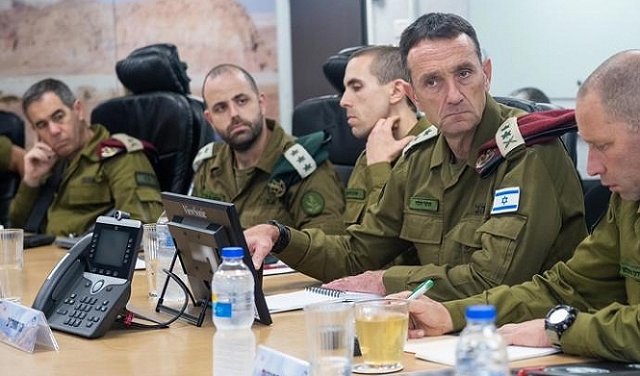
Sana'a - Saba:
A wave of resignations hit the Zionist enemy army, which began yesterday, Tuesday, by Chief of Staff Herzi Halevi, against the backdrop of the failure to repel the "Al-Aqsa Flood" attack, thus continuing the security and political repercussions of the operation carried out by the Islamic Resistance Movement Hamas on October 7, 2023.
Political and military storms have been continuing within the Zionist enemy entity since the start of Operation "Al-Aqsa Flood", the most violent of which is the shock caused by these developments in the structure of the Zionist military leadership, which was represented in successive resignations of prominent military leaders, headed by Halevi.
Experts and analysts agree that this event is not just an administrative change, but rather reflects a deep structural crisis that has struck the roots of the Zionist military establishment and its tense relationship with the government of Benjamin Netanyahu.
In the details, the Zionist Chief of Staff, Herzi Halevi, officially announced his resignation, to take effect on March 6. This resignation came after the failure of the Zionist enemy army to prevent the large crossing that targeted the "Gaza Envelope" settlements, and left its bitter imprint on the security and political scene within the enemy entity.
This resignation coincided with the ceasefire in Gaza, after more than 15 years of genocide that was met with unique Palestinian steadfastness and heroism; which revealed the curtain on severe internal conflicts between the military and political leadership in the Zionist entity.
Halevi's resignation prompted a new wave of resignations in the military establishment, most notably the commander of the Southern Command, Yaron Finkelman, and the head of the military prosecution, Major General Yifat Yerushalmi. This was preceded by the resignation of the head of the Military Intelligence Division, Aharon Haliva, who bore responsibility for the security failure in the events of October 7.
These resignations revealed escalating tension between the military establishment and Benjamin Netanyahu's government, especially with the clear political interference in the affairs of the army.
During the war of extermination, criticism was repeatedly directed at the Prime Minister and Defense Minister Yisrael Katz, due to their interference in military decisions, their deliberate delay of investigations into the army’s failures, and their imposition of controversial appointments to senior positions.
Zionist military analysts confirm that Halevi's resignation was not only due to the security failure, but also came as a result of political pressures, which reflects the depth of the crisis within the occupation army.. indicating that these resignations will leave the occupation army drowning in a leadership crisis, amid the depletion of human resources and escalating political conflicts.
Since the first moments of the "Al-Aqsa Flood" attack, the enemy army has faced accusations of low readiness and confusion in decision-making.
The correspondent of the Zionist newspaper "Yedioth Ahronoth", Amihai Atali, says: The army was "chaotic", immersed in a military doctrine disconnected from reality.. After 15 months of war, "Israel" did not achieve its military goals, and was only able to free its hostages through exchange deals.
Analysts agree that Halevi's resignation will open the door to serious repercussions, most notably the departure of more military leaders and the shaking of confidence between the political and military leadership.
Political analyst and expert on Zionist affairs, Ihab Jabareen, believes that the timing of the resignation comes to embarrass Prime Minister Benjamin Netanyahu and his government. He pointed out that by resigning, Halevi admits the army's failure to perform its duties, holding himself responsible in light of the investigation committee and public pressure.
Jabareen stresses that the failure is not limited to the military level, but extends to the political level that wrote the scenarios and managed the war poorly. He estimates that the resignation puts pressure on Netanyahu, who faces a major challenge to convince international allies - such as the United States - of his government's ability to manage the next stage after 15 months of military and political failure.
He explained that Halevi's resignation at this time means that "Israel" has begun a new phase of internal accountability. He pointed out that the war on Gaza has ended, but "the political war inside "Tel Aviv" has begun now."
Halevi's resignation remains a new link in the chain of crises facing the usurping entity, and is not limited to the military establishment, but extends to the political system as a whole.
Reactions in the Zionist press to Halevi's resignation varied. While some writers called on Prime Minister Benjamin Netanyahu to resign from his government because it is a partner in the failure, others considered the resignation an essential part of the Zionist recognition of the failure to anticipate the Al-Aqsa Flood attack on October 7, 2023.
Others highlighted that Netanyahu's government will exploit this step and the subsequent resignations of other senior officers to make new appointments that will consolidate the government's extreme right-wing approach in political and military matters.
Halevi, whose resignation will take effect on March 6, said in his speech: “The Zionist army failed in its mission to defend Israel, and the state paid a heavy price.” He added: “I bear responsibility for the army’s failure on October 7, 2023. My responsibility for the terrible failure accompanies me day by day and hour by hour.”
Former Zionist Justice Minister Haim Ramon believes that there are three people responsible for this failure: in addition to Halevi, Minister of War Yoav Galant, who submitted his resignation earlier, and Prime Minister Netanyahu.
He says, “As a result, we were forced to conclude an exchange deal that was a complete defeat.” He added, “In order to avoid any misunderstanding, I believe that under the current circumstances there was no choice but to seek to reach an agreement, and at least we will achieve the goal of returning the detainees even at the price of ending the war and keeping sovereignty in Gaza in the hands of Hamas.”
The following are the most prominent Zionist resignations against the backdrop of the military, security and intelligence failure in anticipating and confronting the attack of October 7, 2023:
- On January 21, 2025: The Chief of Staff of the IDF, Herzi Halevi, announces his resignation, effective March 6, and says in a televised speech: "On October 7, we failed in defense and attack, and I will carry the results of that terrible day with me for the rest of my life."
- On the same day, the commander of the Southern Command of the Zionist army, Yaron Finkelman, announces his resignation, and says in his resignation letter: "On October 7, I failed to defend the Western Negev (region), and this failure will remain engraved in my mind for the rest of my life."
- On September 12, 2024: The commander of the 8200 Intelligence Unit in the army, Yossi Sariel, resigns, saying: "On October 7, I did not carry out the mission as I expected and as my subordinates and commanders expected."
- On the same day, the commander of the Zionist police in the occupied West Bank, Major General Uzi Levi, resigns.
- On July 11, 2024: The commander of the Southern Command of the Shin Bet (referred to as "A") resigns due to his failure to deal with the Hamas attack.
- June 9, 2024: The commander of the Gaza Division in the army, Avi Rosenfeld, resigns due to his division's failure to repel the attack, and the ability of the Qassam Brigades fighters, the military wing of Hamas, to occupy the division's headquarters.
- April 22, 2024: The head of the Military Intelligence Division (Aman) Aharon Haliva resigns, and announces that he bears responsibility for the failure on October 7.
- April 4, 2024: The head of the Research Brigade in the Military Intelligence Division, Amit Sa'ar, resigns.
It is expected that the Zionist enemy army will witness more resignations until the end of this January, as Defense Minister Yisrael Katz has set this current date as the date for the army to complete internal investigations into the failure of October 7. In contrast, the Zionist Prime Minister Benjamin Netanyahu refuses to bear any responsibility, clings to his position, and rejects the opposition's calls for early elections.


